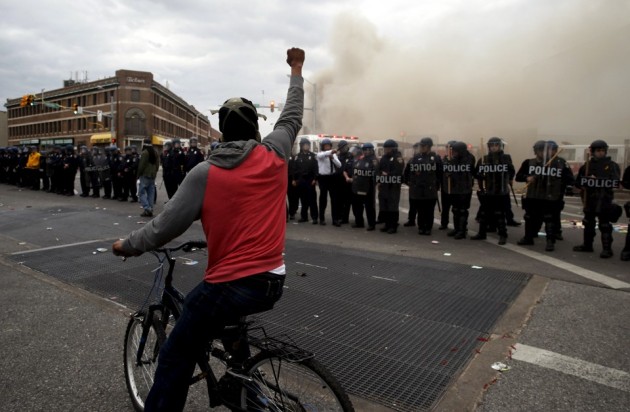Officials calling for calm can offer no rational justification for Gray’s death, and so they appeal for order.
By Ta-Nehisi Coates in The Atlantic
Rioting broke out on Monday in Baltimore—an angry response to the death of Freddie Gray, a death my native city seems powerless to explain. Gray did not die mysteriously in some back alley but in the custody of the city’s publicly appointed guardians of order. And yet the mayor of that city and the commissioner of that city’s police still have no idea what happened. I suspect this is not because the mayor and police commissioner are bad people, but because the state of Maryland prioritizes the protection of police officers charged with abuse over the citizens who fall under its purview.
The citizens who live in West Baltimore, where the rioting began, intuitively understand this. I grew up across the street from Mondawmin Mall, where today’s riots began. My mother was raised in the same housing project, Gilmor Homes, where Freddie Gray was killed. Everyone I knew who lived in that world regarded the police not with admiration and respect but with fear and caution. People write these feelings off as wholly irrational at their own peril, or their own leisure. The case against the Baltimore police, and the society that superintends them, is easily made:
Over the past four years, more than 100 people have won court judgments or settlements related to allegations of brutality and civil rights violations. Victims include a 15-year-old boy riding a dirt bike, a 26-year-old pregnant accountant who had witnessed a beating, a 50-year-old woman selling church raffle tickets, a 65-year-old church deacon rolling a cigarette and an 87-year-old grandmother aiding her wounded grandson ….
And in almost every case, prosecutors or judges dismissed the charges against the victims—if charges were filed at all. In an incident that drew headlines recently, charges against a South Baltimore man were dropped after a video showed an officer repeatedly punching him—a beating that led the police commissioner to say he was “shocked.”
The money paid out by the city to cover for the brutal acts of its police department would be enough to build “a state-of-the-art rec center or renovations at more than 30 playgrounds.” Instead, the money was used to cover for the brutal acts of the city’s police department and ensure they remained well beyond any semblance of justice.
Now, tonight, I turn on the news and I see politicians calling for young people in Baltimore to remain peaceful and “nonviolent.” These well-intended pleas strike me as the right answer to the wrong question. To understand the question, it’s worth remembering what, specifically, happened to Freddie Gray. An officer made eye contact with Gray. Gray, for unknown reasons, ran. The officer and his colleagues then detained Gray. They found him in possession of a switchblade. They arrested him while he yelled in pain. And then, within an hour, his spine was mostly severed. A week later, he was dead. What specifically was the crime here? What particular threat did Freddie Gray pose? Why is mere eye contact and then running worthy of detention at the hands of the state? Why is Freddie Gray dead?
Read more at The Atlantic


I do not have cable TV anymore. Actually, I get my news from the net. Thank you for sharing this information. I found out it was about police violence last night but I wanted to read more about what is happen in that community.
LikeLiked by 1 person
I have every channel known to man, and yet I rarely watch television. Like you, I missed this major news story at first. Stories of outrageous police behavior have become so commonplace in America that we have become insensitive to them.
When an American citizen dies in police custody, it should not take a grand jury to explain the circumstances. If the responsible authorities must take days or weeks or even months to offer up a plausible explanation to the American public, then their priorities are obviously flawed and self-serving. There needs to be a serious revision of police procedures and protocols in this country, because what the average American now sees in the news almost daily are municipal police forces more interested in protecting themselves from lawsuits than they are in explaining and justifying their behavior.
These people are public servants. And as much as I appreciate and respect their sense of duty and dedication to public service, every one of these must understand that they serve all of the people of this country–every one–and not just those whom they identify with. If a police officer thinks that black people, or punk kids, or gays, or Mexicans are “the problem,” then they have no business being police officers. Yeah, we get it. It’s a tough, stressful and dangerous job. But that is no excuse for murder. And like every other citizen, if you can’t explain your justification for killing another human being, then you should be charged with murder.
LikeLiked by 1 person
I saw a change in how the police operate during the Bush years after 9/11. All the changes that were made to develop and enforce a police force that was becoming more accountable were backed out and intensified in the wrong direction. Once in the hands of our justice system, we are no longer looked upon as human beings. That is the wrong direction for a free and more caring society. Justice needs to be served when our police start abusing our citizens especially the poor and minorities.
LikeLike